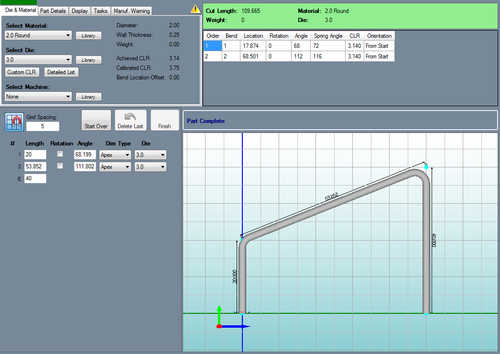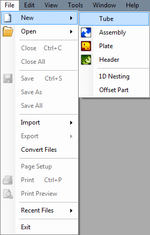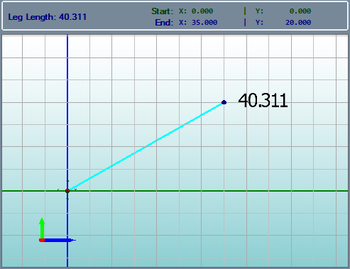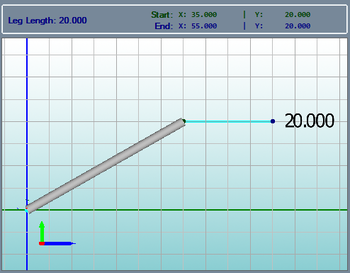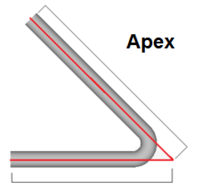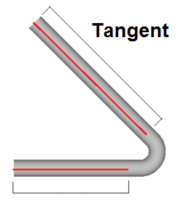Sketch 2D
Bend-Tech 7x Wiki :: Sketch 2D
- Sketch 2D allows parts to be created on a two dimensional plane. These kind of parts can have either no rotation or 180° rotation on bends. In other words, parts made in this designer will be flat, two dimensional parts.
- Parts can be designed by selecting the part in the display area and drawing out each length and/or by giving the straight length and angle values in the design panel.
Selection
To create a Sketch 2D Part1.) Go to the File menu, select New, then select Tube. In the Create New menu, click on the Sketch 2D option.
2.) Select the New Part icon and select the Sketch 2D option in theCreate New menu.
...OR
3.) Select the Sketch 2D option from the Task Menu that appears when the software starts up, when all designs are closed, or through the view menu.
Design
- Once Sketch 2D is selected, a new part design window will open. If a default die and material have not been set, a die and material must be chosen before designing the part. If necessary, choose a material, die, and/or machine in the Die and Material tab. Once a die and material are selected, the Sketch 2D part design section will appear.
- Next, the part can be designed by drawing out the part lengths in the part display and/or typing in length and angle values.
- To design a part, start by selecting a point in the display area where the first length of the part will begin. Once this point is selected, a light blue line will be connected to this point (as shown to the right). The length of the current part section will be generated at the end of this line.
- The leg length and XY coordinates of the start and end of the current length will be generated above the part design area.
- The next point that is selected will be the end point of the first straight length of tube. After this second point is chosen, the display will show the part's first straight length in the chosen material. The light blue line will now be attached to the end point of this length. Continue this process of choosing the start and end points until the part is complete.
- As new lengths and bends are drawn, the lengths, rotations, and angles will be generated in the columns on the left of the screen. Each bend and the last straight length will have its own row.
- These can be edited at any point in the design process. Adjust the lengths and angles by entering new values in the text fields.
- Once the part is complete, select the "Finish"
 button. (Note) This is temporary. Edits can still be executed after a design session is stopped. This will only stop further lengths/bends from being drawn.
button. (Note) This is temporary. Edits can still be executed after a design session is stopped. This will only stop further lengths/bends from being drawn.
- To completely restart the part design, select the "Start Over"
 button. "Caution: This will completely delete the part design and cannot be undone."
button. "Caution: This will completely delete the part design and cannot be undone."
- To add a 180° rotation, check the rotation box in the rotation column next to the bend where the rotation will occur.
- Each bend can be also be assigned a die by either selecting the bend number in the bend list and selecting a die or custom CLR from the Die drop down menu. Each bend can also be assigned a dimension type by selecting either Apex or Tangent from the Dim Type drop down menu.
- Apex will measure to the outside intersection (apex) of the bends two legs. Tangent will measure to the edge of the bends, the tangents, so no bent material will be included in the measurements. See images below.
